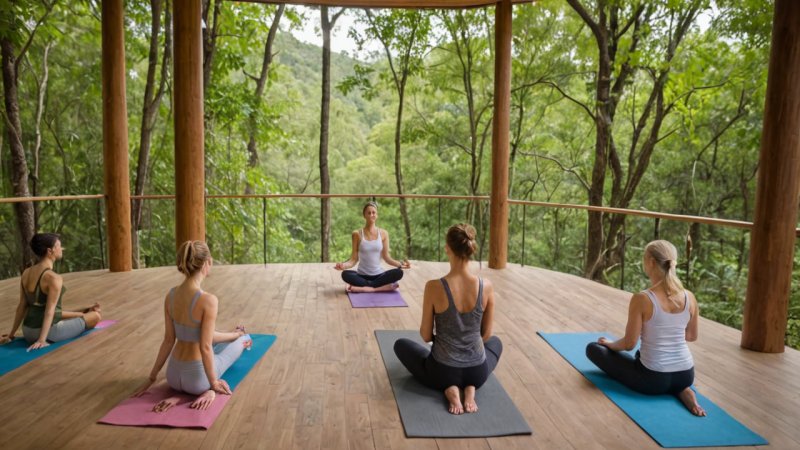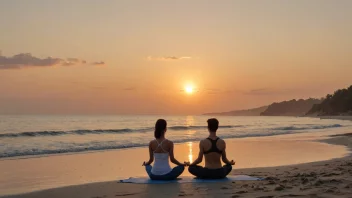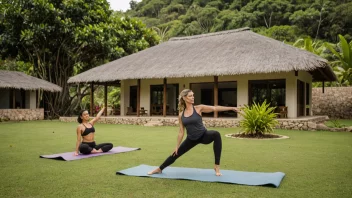In the fast-paced world we live in today, anxiety has become a common ailment, affecting millions of people globally. To address this, wellness retreats have emerged as popular sanctuaries, providing individuals with the opportunity to escape their everyday stressors and embrace tranquility. To delve deeper into the topic, we had a fictional interview with Dr. Emily Harper, a renowned psychologist and wellness coach specializing in anxiety relief through holistic practices.
Understanding Anxiety and Its Impact
Interviewer: Dr. Harper, thank you for joining us. Can you explain how anxiety manifests in individuals and the importance of addressing it?
Dr. Harper: Absolutely. Anxiety can present itself in various forms, including persistent worry, restlessness, and even physical symptoms like increased heart rate. It can significantly impact one’s quality of life, leading to difficulties in personal relationships, work, and overall well-being. Addressing anxiety is crucial because it allows individuals to regain control over their lives and find peace.
The Role of Wellness Retreats
Interviewer: Why do you think wellness retreats are effective for those struggling with anxiety?
Dr. Harper: Wellness retreats offer a unique environment that promotes relaxation and self-discovery. They provide a break from daily stressors and often incorporate practices like yoga, meditation, and mindfulness—each of which has proven benefits for anxiety relief. The serene settings, away from urban distractions, allow individuals to reconnect with themselves and learn coping strategies in a supportive community.
Key Elements of a Good Wellness Retreat
Interviewer: What should individuals look for when selecting a wellness retreat for anxiety relief?
Dr. Harper: Several key elements can enhance the effectiveness of a wellness retreat:
- Qualified Professionals: Look for retreats led by certified instructors and therapists who specialize in anxiety management.
- Holistic Approaches: Seek retreats that offer a variety of therapies, including yoga, meditation, and nutrition workshops.
- Natural Environment: Locations surrounded by nature can amplify the calming effects of the retreat.
- Community Support: A nurturing community fosters connection and shared experiences, which can be incredibly comforting.
Unique Experiences to Explore
Interviewer: Can you share some unique experiences that retreat-goers might encounter that specifically help with anxiety?
Dr. Harper: Certainly! Here are a few unique experiences that can be beneficial:
- Guided Forest Bathing: This practice encourages individuals to immerse themselves in nature, promoting mindfulness and reducing stress.
- Sound Healing Sessions: Utilizing sound frequencies can create deep relaxation and release emotional blockages.
- Art Therapy Workshops: Engaging in creative expression can be incredibly therapeutic and a great way to process emotions.
- Digital Detox: Many retreats encourage participants to disconnect from their devices, allowing for a deeper focus on personal growth and interaction with others.
After the Retreat: Continuing the Journey
Interviewer: Once participants return home, what tips do you have for maintaining the calm they found at the retreat?
Dr. Harper: It’s essential to integrate the experiences and lessons learned into daily life. Here are some recommendations:
- Regular Practice: Incorporate yoga and meditation into your routine, even if just for a few minutes daily.
- Mindfulness Journaling: Keep a journal to reflect on your thoughts and feelings, which can help in managing anxiety.
- Connect with Nature: Make a habit of spending time outdoors, as nature has a profound effect on mental well-being.
- Seek Support: Don’t hesitate to reach out to friends or professionals if you feel your anxiety creeping back.
Final Thoughts
Interviewer: Thank you, Dr. Harper, for your insights. Any final advice for those considering a wellness retreat?
Dr. Harper: Choose a retreat that resonates with you personally, and be open to the journey. Healing is a process, and a wellness retreat can be a vital step towards finding lasting calm in your life.






